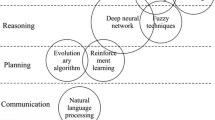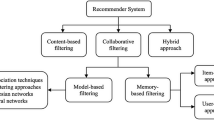Abstract
The traditional collaborative filtering algorithm is a successful recommendation technology. The core idea of this algorithm is to calculate user or item similarity based on user ratings and then to predict ratings and recommend items based on similar users’ or similar items’ ratings. However, real applications face a problem of data sparsity because most users provide only a few ratings, such that the traditional collaborative filtering algorithm cannot produce satisfactory results. This paper proposes a new topic model-based similarity and two recommendation algorithms: user-based collaborative filtering with topic model algorithm (UCFTM, in this paper) and item-based collaborative filtering with topic model algorithm (ICFTM, in this paper). Each review is processed using the topic model to generate review topic allocations representing a user’s preference for a product’s different features. The UCFTM algorithm aggregates all topic allocations of reviews by the same user and calculates the user most valued features representing product features that the user most values. User similarity is calculated based on user most valued features, whereas ratings are predicted from similar users’ ratings. The ICFTM algorithm aggregates all topic allocations of reviews for the same product, and item most valued features representing the most valued features of the product are calculated. Item similarity is calculated based on item most valued features, whereas ratings are predicted from similar items’ ratings. Experiments on six data sets from Amazon indicate that when most users give only one review and one rating, our algorithms exhibit better prediction accuracy than other traditional collaborative filtering and state-of-the-art topic model-based recommendation algorithms.





Similar content being viewed by others
Notes
References
Abdelwahab A, Sekiya H, Matsuba I, Horiuchi Y, Kuroiwa S (2009) Collaborative filtering based on an iterative prediction method to alleviate the sparsity problem. In: Proceedings of the 11th international conference on information integration and web-based applications and services. ACM Press, pp 375–379
Adomavicius G, Tuzhilin A (2005) Toward the next generation of recommender systems: a survey of the state-of-the-art and possible extensions. IEEE Trans Knowl Data Eng 17(6):734–749
Ahn HJ (2008) A new similarity measure for collaborative filtering to alleviate the new user cold-starting problem. Inf Sci 178(1):37–51
Blei DM, Ng AY, Jordan MI (2003) Latent dirichlet allocation. JMLR 3:993–1022
Ganu G, Marian A, Elhadad N (2010) Ursauser review structure analysis: understanding online reviewing trends. DCS technical report
Grcar M, Mladenic D, Fortuna B, Grobelnik M (2006) Data sparsity issues in the collaborative filtering framework. Lect Notes Comput Sci 4198:58–76. doi:10.1007/11891321_4
Haruechaiyasak C, Damrongrat C (2008) Article recommendation based on a topic model for wikipedia selection for schools. Lect Notes Comput Sci 5362:339–342. doi:10.1007/978-3-540-89533-6_39
Hu M, Liu B (2004) Mining and summarizing customer reviews. In: Proceedings of the tenth ACM SIGKDD international conference on Knowledge discovery and data mining. ACM Press, pp 168–177
Hu M, Liu B (2004) Mining opinion features in customer reviews. In: Proceedings of the national conference on artificial intelligence. AAAI Press, pp 755–760
Hu M, Liu B (2006) Opinion extraction and summarization on the web. In: Proceedings of the 21st national conference on artificial intelligence. AAAI Press, pp 1621–1624
Jin X, Zhou Y, Mobasher B (2005) A maximum entropy web recommendation system: combining collaborative and content features. In: Proceedings of the eleventh ACM SIGKDD international conference on Knowledge discovery in data mining. ACM Press, pp 612–617
Jo Y, Oh AH (2011) Aspect and sentiment unification model for online review analysis. In: Proceedings of the fourth ACM international conference on Web search and data mining. ACM Press, pp 815–824
Lin C, He Y (2009) Joint sentiment/topic model for sentiment analysis. In: Proceedings of the 18th ACM conference on information and knowledge management. ACM Press, pp 375–384
Linden G, Smith B, York J (2003) Amazon.com recommendations: item-to-item collaborative filtering. IEEE Internet Comput 7(1):76–80
Liu B, Hu M, Cheng J (2005) Opinion observer: analyzing and comparing opinions on the web. In: Proceedings of the 14th international conference on World Wide Web. ACM Press, pp 342–351
Mei Q, Ling X, Wondra M, Su H, Zhai CX (2007) Topic sentiment mixture: modeling facets and opinions in weblogs. In: Proceedings of the 16th international conference on World Wide Web. ACM Press, pp 171–180
Pan W, Liu N, Xiang E, Yang Q (2011) Transfer learning to predict missing ratings via heterogeneous user feedbacks. In: Proceedings of the twenty-second international joint conference on artificial intelligence-volume volume three. AAAI Press, pp 2318–2323
Pan W, Xiang EW, Liu NN, Yang Q (2010) Transfer learning in collaborative filtering for sparsity reduction. In: Proceedings of the 24rd AAAI conference on artificial intelligence. ACM
Papagelis M, Plexousakis D, Kutsuras T (2005) Alleviating the sparsity problem of collaborative filtering using trust inferences. Trust Manag 3477:125–140. doi:10.1007/11429760_16
Pennacchiotti M, Gurumurthy S (2011) Investigating topic models for social media user recommendation. In: Proceedings of the 20th international conference companion on World Wide Web. ACM Press, pp 101–102
Sarwar B, Karypis G, Konstan J, Riedl J (2001) Item-based collaborative filtering recommendation algorithms. In: Proceedings of the 10th international conference on World Wide Web. ACM, pp 285–295
Schafer J, Frankowski D, Herlocker J, Sen S (2007) Collaborative filtering recommender systems. In: ADAP WEB, pp 291–324
Schein A, Popescul A, Ungar L, Pennock D (2002) Methods and metrics for cold-start recommendations. In: Proceedings of the 25th annual international ACM SIGIR conference on Research and development in information retrieval. ACM, pp 253–260
Sriurai W, Meesad P, Haruechaiyasak C (2009) Recommending related articles in wikipedia via a topic-based model. In: IICS, pp 194–203
Su X, Khoshgoftaar TM (2009) A survey of collaborative filtering techniques. Adv Artif Intell 4:2. doi:10.1155/2009/421425
Titov I, McDonald R (2008) A joint model of text and aspect ratings for sentiment summarization. In: Proceedings of 46th annual meeting of the association for computational linguistics (ACL08)
Wang C, Blei DM (2011) Collaborative topic modeling for recommending scientific articles. In: Proceedings of the 17th ACM SIGKDD international conference on Knowledge discovery and data mining. ACM Press, pp 448–456
Wei K, Huang J, Fu S (2007) A survey of e-commerce recommender systems. In: International conference on Service systems and service management. IEEE, pp 1–5
Wofford J (2012) User-generated content. Media Soc 14(7):1236–1239
Acknowledgments
This work was supported in part by the National Natural Science Foundation of China (Grant No. 61003254), the National Key Technology R&D Program (No. 2012BAH16F02), and the Fundamental Research Funds for the Central Universities.
Author information
Authors and Affiliations
Corresponding author
Rights and permissions
About this article
Cite this article
Zheng, X., Ding, W., Xu, J. et al. Personalized recommendation based on review topics. SOCA 8, 15–31 (2014). https://doi.org/10.1007/s11761-013-0140-8
Received:
Revised:
Accepted:
Published:
Issue Date:
DOI: https://doi.org/10.1007/s11761-013-0140-8




